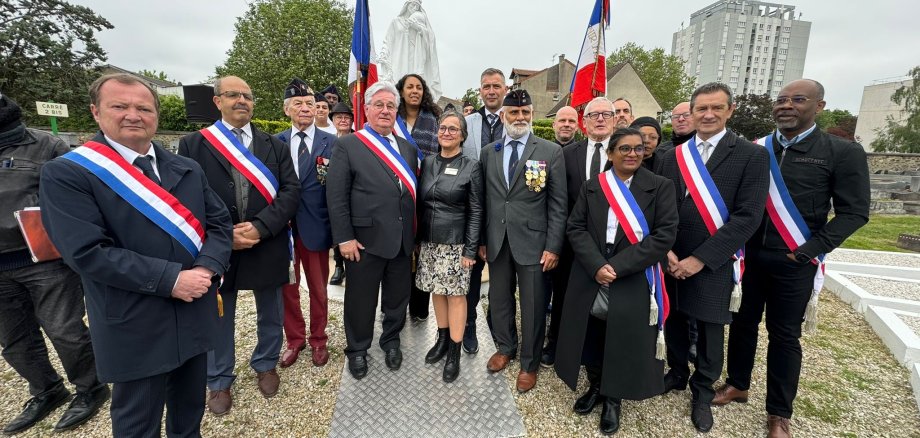Liberation Day
On the occasion of Liberation Day on 8 May, Mayor Sabine Löser travelled to the twin town of Pierrefitte-sur-Seine at the invitation of the mayor there and took part in the commemorative event. In her speech, she said, among other things:
"Almost exactly 84 years ago, on 10 May 1940, the Nazi regime began its western campaign and within a few weeks invaded France, the Netherlands, Belgium and Luxembourg in martial fashion and placed the territories under German occupation.
The Nazi regime of terror thus plunged France into the third war between the two neighbouring countries in just seven decades, after 1870/71 and the First World War, the Grande Guerre. [...]
Today we can be glad that we have not only lived together in peace for almost 80 years, but that friendships have developed and that we see ourselves as partners in a united Europe.
At the same time, the wars in Ukraine, Gaza and far too many other places in the world remind us that this structure is neither God-given nor stable forever.
In fact, there was a time in the 1920s when people were very liberal by the standards of the time and with regard to society. But little by little, these achievements began to disappear. Crises were used to prioritise ideologies over solutions. Language became radicalised. There was a return to yesterday.
The publicist Victor Klemperer described this as follows in his book on the language of the Third Reich:
"Words can be like tiny doses of arsenic. They are swallowed unnoticed, they seem to have no effect, but after a while the poisonous effect is there."
In the early afternoon of the same day, a memorial service was also held in the district of Hennickendorf. The deputy mayor Marco Böttche said the following in his speech:
"At the end of a war in which more than 60 million victims were mourned. After years of the Nazi regime of terror. The unimaginable industrial mass murders, deportations and persecution of Jews, homosexuals, Sinti and Roma and all those who did not fit into the inhuman world view.
The cruelty of the industrialised extermination of human beings is still difficult to comprehend and even more difficult to understand.
Last weekend's events, in which democrats were attacked and beaten up during the election campaign, are yet another warning signal. And what attracted nationwide attention in Saxony at the weekend also happened here recently in our neighbouring community.
Although we are in a constant state of change, not every change is a crisis that should justify demagogues in questioning the foundations of our democracy and our coexistence.
Our history has given us the responsibility to understand the warning signals, to take them seriously and to take decisive action against arsenic doses.
We can, no, we must all contribute every day to ensuring that we continue to live in a peaceful and cosmopolitan Europe. Let's get on with it."
The 2nd Deputy Chairwoman of the municipal council added the following thoughts in her speech
"79 years ago today, Hitler's Germany surrendered to the armies of the Allied Forces. The murderous and criminal Second World War came to an end, at least in Europe, while in other parts of the world it continued with unrelenting cruelty right up to the war-criminal dropping of the atomic bombs on Hiroshima and Nagasaki.
The war left behind an infinite number of victims, destruction and suffering for everyone involved. The peoples of the Soviet Union in particular suffered more than 25 million deaths - soldiers and civilians alike. In Leningrad alone, 1 million people died during the 900-day blockade. The German fascists not only wanted to exterminate the Jewish population in Europe, but also the "Jewish-Bolshevik subhumans" of the Soviet Union. The fact that the latter did not succeed is also due to the often heroic resistance of the Soviet Red Army, which ultimately paid a high price in blood for the liberation of Germany from Hitlerite fascism.
Yes, liberation, even if not everyone saw it that way then or now.
There were only a few who stood up to the criminal regime and often paid for it with their lives. Perhaps the Stasi headquarters in Hohenschönhausen should not necessarily be part of the compulsory programme in our schools, but rather the German Resistance Memorial and the Plötzensee prison and execution site.
War is always inhumane. There is no humane reason why some soldiers have to kill others. And war is not "the mere continuation of politics by other means", as Carl von Clausewitz postulated. Above all, it is the capitulation of diplomacy and co-operation to violence, power and profit interests. And war never arises out of nothing, completely by chance. Every war has a prehistory. Unfortunately, German soldiers are also practising war in the East again today. That is why, especially now, in the face of this increasing war-mongering and in memory of the unspeakable suffering of the last world war, the determined resistance of many is needed. Let us not allow ourselves to be "war-minded", but let us fight with all our strength for "peace-mindedness"."

